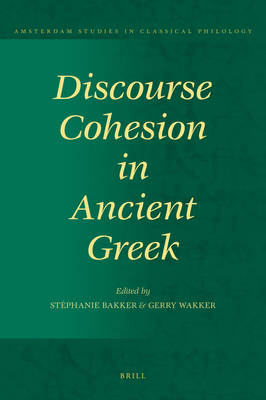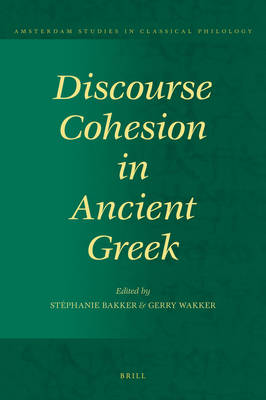
- Afhalen na 1 uur in een winkel met voorraad
- Gratis thuislevering in België vanaf € 30
- Ruim aanbod met 7 miljoen producten
- Afhalen na 1 uur in een winkel met voorraad
- Gratis thuislevering in België vanaf € 30
- Ruim aanbod met 7 miljoen producten
Zoeken
Discourse Cohesion in Ancient Greek
€ 232,45
+ 464 punten
Omschrijving
Central in this volume of the 6th International Colloquium on Ancient Greek Linguistics is the question how cohesion is created in Ancient Greek texts. The contributions to the volume either discuss the various cohesive devices that occur in a specific text or focus on the use and function of a particular cohesion device in a larger corpus. Apart from the use of pronomina and particles, less standard cohesive devices, like the use of tense and the grammatical form of complements, are taken into consideration. The result is a volume that gives a good impression of recent research in the field of Greek linguistics, not only of interest for classical scholars, but also for general linguists interested in discourse coherence cnd cohesion.
Contributors include: Rutger J. Allan, Stéphanie J. Bakker, Louis Basset, Anna Bonifazi, Annemieke Drummen, Marietje (A.M.) van Erp Taalman Kip, Coulter H. George, Luuk Huitink, Sander Orriens, Annemieke van der Plaat, Antonio Revuelta, Albert Rijksbaron and Gerry C. Wakker.
Contributors include: Rutger J. Allan, Stéphanie J. Bakker, Louis Basset, Anna Bonifazi, Annemieke Drummen, Marietje (A.M.) van Erp Taalman Kip, Coulter H. George, Luuk Huitink, Sander Orriens, Annemieke van der Plaat, Antonio Revuelta, Albert Rijksbaron and Gerry C. Wakker.
Specificaties
Betrokkenen
- Uitgeverij:
Inhoud
- Aantal bladzijden:
- 304
- Taal:
- Engels
- Reeks:
- Reeksnummer:
- nr. 16
Eigenschappen
- Productcode (EAN):
- 9789004174726
- Verschijningsdatum:
- 30/09/2009
- Uitvoering:
- Hardcover
- Formaat:
- Genaaid
- Afmetingen:
- 168 mm x 246 mm
- Gewicht:
- 639 g

Alleen bij Standaard Boekhandel
+ 464 punten op je klantenkaart van Standaard Boekhandel
Beoordelingen
We publiceren alleen reviews die voldoen aan de voorwaarden voor reviews. Bekijk onze voorwaarden voor reviews.










